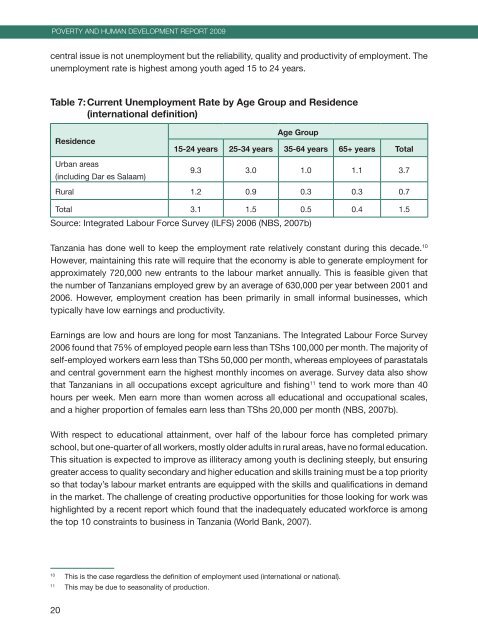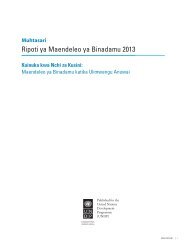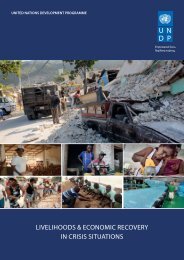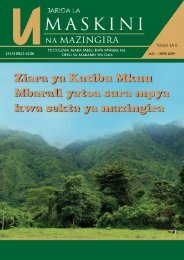Poverty and Human Development Report 2009 - UNDP in Tanzania
Poverty and Human Development Report 2009 - UNDP in Tanzania
Poverty and Human Development Report 2009 - UNDP in Tanzania
You also want an ePaper? Increase the reach of your titles
YUMPU automatically turns print PDFs into web optimized ePapers that Google loves.
pOVertY aND hUMaN DeVeLOpMeNt repOrt <strong>2009</strong><br />
central issue is not unemployment but the reliability, quality <strong>and</strong> productivity of employment. the<br />
unemployment rate is highest among youth aged 15 to 24 years.<br />
Table 7: Current Unemployment Rate by Age Group <strong>and</strong> Residence<br />
(<strong>in</strong>ternational def<strong>in</strong>ition)<br />
Residence<br />
Urban areas<br />
(<strong>in</strong>clud<strong>in</strong>g dar es salaam)<br />
20<br />
Age Group<br />
15-24 years 25-34 years 35-64 years 65+ years Total<br />
9.3 3.0 1.0 1.1 3.7<br />
rural 1.2 0.9 0.3 0.3 0.7<br />
total 3.1 1.5 0.5 0.4 1.5<br />
source: <strong>in</strong>tegrated labour force survey (ilfs) 2006 (nbs, 2007b)<br />
tanzania has done well to keep the employment rate relatively constant dur<strong>in</strong>g this decade. 10<br />
however, ma<strong>in</strong>ta<strong>in</strong><strong>in</strong>g this rate will require that the economy is able to generate employment for<br />
approximately 720,000 new entrants to the labour market annually. this is feasible given that<br />
the number of tanzanians employed grew by an average of 630,000 per year between 2001 <strong>and</strong><br />
2006. however, employment creation has been primarily <strong>in</strong> small <strong>in</strong>formal bus<strong>in</strong>esses, which<br />
typically have low earn<strong>in</strong>gs <strong>and</strong> productivity.<br />
earn<strong>in</strong>gs are low <strong>and</strong> hours are long for most tanzanians. the <strong>in</strong>tegrated labour force survey<br />
2006 found that 75% of employed people earn less than tshs 100,000 per month. the majority of<br />
self-employed workers earn less than tshs 50,000 per month, whereas employees of parastatals<br />
<strong>and</strong> central government earn the highest monthly <strong>in</strong>comes on average. survey data also show<br />
that tanzanians <strong>in</strong> all occupations except agriculture <strong>and</strong> fish<strong>in</strong>g 11 tend to work more than 40<br />
hours per week. Men earn more than women across all educational <strong>and</strong> occupational scales,<br />
<strong>and</strong> a higher proportion of females earn less than tshs 20,000 per month (nbs, 2007b).<br />
with respect to educational atta<strong>in</strong>ment, over half of the labour force has completed primary<br />
school, but one-quarter of all workers, mostly older adults <strong>in</strong> rural areas, have no formal education.<br />
this situation is expected to improve as illiteracy among youth is decl<strong>in</strong><strong>in</strong>g steeply, but ensur<strong>in</strong>g<br />
greater access to quality secondary <strong>and</strong> higher education <strong>and</strong> skills tra<strong>in</strong><strong>in</strong>g must be a top priority<br />
so that today’s labour market entrants are equipped with the skills <strong>and</strong> qualifications <strong>in</strong> dem<strong>and</strong><br />
<strong>in</strong> the market. the challenge of creat<strong>in</strong>g productive opportunities for those look<strong>in</strong>g for work was<br />
highlighted by a recent report which found that the <strong>in</strong>adequately educated workforce is among<br />
the top 10 constra<strong>in</strong>ts to bus<strong>in</strong>ess <strong>in</strong> tanzania (world bank, 2007).<br />
10 this is the case regardless the def<strong>in</strong>ition of employment used (<strong>in</strong>ternational or national).<br />
11 this may be due to seasonality of production.





